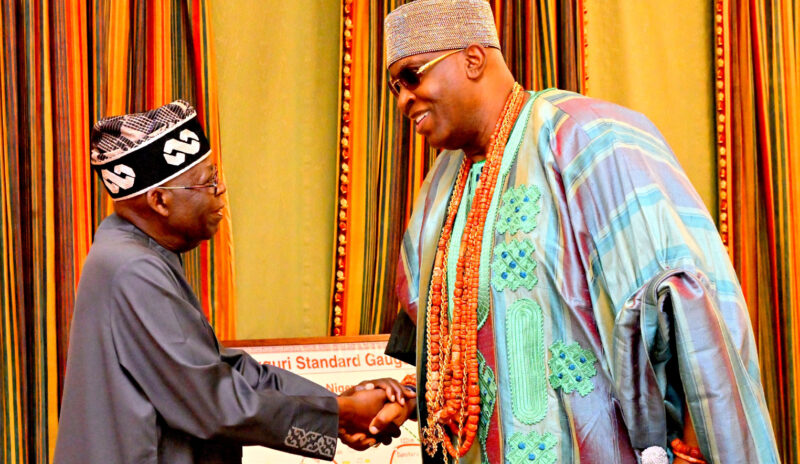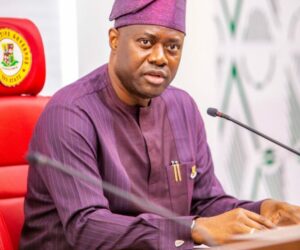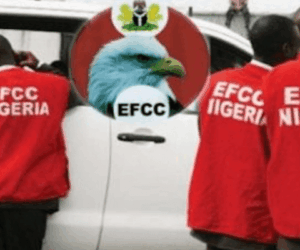0
…Says Bold Reforms Have Reversed Years Of Corruption
…FG Rakes In Record N20.59trn Non-Oil Revenue In 8 Months
President Bola Tinubu on Tuesday reflected on his administration’s strides in the last two years, saying with political will and prudent management, the economy has now been stabilised, while loopholes for fleecing the country of its resources have been blocked.
He equally stated that in just two years of the administration, the bold economic reforms embarked upon are visible and has lifted Nigeria to an enviable position, among its peers globally.
According to the president, “The country’s economy is now stable and attracting interest from around the world”.
The president gave the scorecard at the State House, Abuja, when he received His Imperial Majesty, Oba Ghandi Afolabi Oladunni Olaoye, Orumogege III, the Soun of Ogbomosoland, in audience with some other royal fathers.
Tinubu said, “Years of neglect and self-deception, fake records, smuggling, and all of that denied Nigeria the necessary revenue for progress and development.
“Then we were confronted again with arbitrage trading of currency, an illusion of selling papers, corruption all over the place, and the integrity of the country and its economy being extremely and adversely challenged.
“We had to take those actions. With your prayers, patience, perseverance and great understanding, I’m glad to tell you today that the economy is stabilised. The bleeding has stopped. Haemorrhage is gone; the patient is alive.”
Citing the need for establishing NELFUND, he said it was to ensure that no student would drop out because of poverty.
The president, through a statement from his Special Adviser on Information and Strategy, Bayo Onanuga, affirmed that everybody has a right to education as it is the “greatest weapon you can give to human beings against poverty; that’s what we are doing. We have remained aggressive on our infrastructure. And it’s just two years.”
He lauded the Soun of Ogbomoso for crediting his administration with the bold decisions taken immediately upon resumption of office.
He noted that the people of Ogbomosoland were already feeling the modernisation and transformation introduced by the monarch, who promised to strengthen traditional institutions.
The president promised to engage the Ministers of Power, Water Resources, Agriculture, and Works to look into the visiting monarch’s requests, stating they can make Nigeria self-sufficient in agriculture.
The Soun commended the president for his incredible strides, which “only a bold leader could have recorded. Removing fuel subsidy has shown us that it is the right decision, and we can see the effects.”
Oba Ghandi Olaoye said the foreign exchange reforms and introduction of NELFUND have made it easier for many students to continue their schooling without considering dropping out.
The monarch also praised the president for awarding the contract for dualisation of the Oyo-Ogbomosho Road, which had been abandoned for decades, pointing out that the road would spur economic activities as a significant gateway to the North.
The paramount ruler, however, requested the president’s intervention in the water and power supply in Ogbomoso, the upgrading of the General Hospital in the town into a Federal Medical Centre, as well as the establishment of a research institute to enhance the development and transformation of the famous ‘Ogbomoso mangoes and cashew nuts’ into a viable agricultural enterprise.
Oba Olaoye thanked the president for appointing Ogbomoso sons to his administration, notably the Federal Inland Revenue Service Chairman, Zacch Adedeji, and the DG of the Bureau of Public Procurement, Debo Adedokun.
On the entourage of the Soun of Ogbomosoland were five other kings representing the five councils in Ogbomosoland, namely High Chief Samuel Otolorin, the Areago of Ogbomosoland; HRM, Oba Oyetunji Adeyeye, the Alajaawa of Ajaawa; HRM Oba Bolarinwa Ezekiel Olajide, the Onisapa of Isapa; HRM Oba Babatunde Amao, the Aale Oke-elerin, and HRM Oba (Prof.) Akinola John Akintola, the Olokin-apa of Okin-apa.
Others were High Chief Ogundare Oluwakemi Rebecca, Iyalode of Ogbomosoland; Prof. Sola Adepoju, former DG, Forestry Research Institute of Nigeria; Chief Tunji Olaniyi, a businessman, and Alhaji Abdul Ganiyu Atanda Owodunni, the Aare Musulumi of Ogbomosoland.
The Special Adviser to the President on Media and Public Communication, Chief Sunday Dare, a prominent ‘son of the soil’ who doubles as the Agbaakin of Ogbomosoland was also there.
FG Rakes In 20.59trn Non-Oil Revenue Between Jan., Aug
Meanwhile, President Bola Tinubu has confirmed a N20.59 trillion revenue base accrued into the federation account from non-oil sources between January to August 2025.
Tinubu, who expressed excitement over the revenue base which he said represented a 40.5% increase from N14.6 trillion recorded in 2024, said the fiscal performance represents the highest in recent history.
“Non-oil revenues accruing to the federal, state, and local governments. From January to August 2025, total collections reached N20.59 trillion, a 40.5% increase from N14.6 trillion recorded in 2024. This strong performance aligns with projections, placing the government firmly on course to achieve its annual non-oil revenue target,” the presidency confirmed.
The presidency said the latest revenue figures for January–August 2025, is proof that Nigeria is achieving unprecedented growth in non-oil collections, a direct result of reforms to improve the government’s fiscal position, strengthen compliance, and digitise tax administration.
The president made a pointed reference to this positive growth trajectory in non-oil revenue mobilisation on Tuesday while addressing a delegation of the Buhari Organisation led by Senator Tanko Al-Makura, which a section of the media reported out of context.
The president had earlier boasted that the Federal Government is no longer borrowing from local banks to buttress the strong fiscal performance since the start of the year.
Tinubu, through his media aide, Bayo Onanuga, lauded the commitment to tax revenues, which do not include dollar oil receipts, where targets are not being met because of the slump in the crude oil market.
The statement from the presidency reads in full, “As part of this administration’s inclusive growth policy, resources are being directed closer to the people. Therefore, increased revenues have translated into record FAAC disbursements. For the first time in history, monthly allocations to states and local governments crossed N2 trillion in July 2025, providing subnational governments with greater fiscal space to fund food security, infrastructure, and social services.
“Notwithstanding, these increases in revenues do not yet match the president’s ambitions for expenditures on education, health, and infrastructure; therefore, all efforts are being made to address these gaps.
“Nigeria’s fiscal foundations are being reshaped. For the first time in decades, oil is no longer the dominant driver of government revenue. The combination of reforms, compliance, and digitisation powers a more resilient economy. The task ahead is to ensure that these gains are felt in the lives of our citizens and in better schools, hospitals, roads, and jobs.”
On how the government achieved the feat, Tinubu noted that Nigeria mobilised N20.59 trillion in eight months, the most substantial collection in recent history.
Non-Oil is now the engine: With N15.69 trillion collected, non-oil revenues account for three out of every four naira, showing a fundamental shift away from oil dependence.
Beyond Inflation: While inflation and FX revaluation contributed, the uplift is primarily reform-driven — digitised filings, Customs automation, tighter enforcement, and broadened compliance.
Customs over performance: N3.68 trillion was collected in H1, N390 billion above target, and already 56% of the full-year goal. This reflects systemic changes, not one-off windfalls.
States’ fiscal space expanded: FAAC allocations reached N2 trillion in July for the first time, giving states resources to strengthen local development.
On track, not over claiming: The government affirms collections are ahead of pro-rata expectations, with final validation to be published by the Budget Office at the end of the year.
Revenues are rising, the base is broadening, and reforms are working. The priority is translating these numbers into real relief for citizens by putting food on the table, creating jobs for young people, and investing in roads, schools, and hospitals.






